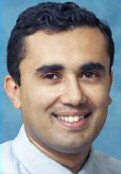He keeps a low profile but Dr Arjun Kalyanpur is easily the most well-known radiologist practising teleradiology in India today. His firm, Teleradiology Solutions, not only provides services to hospitals in the U.S. but is also in the process of establishing business relationships with hospitals in Singapore, Japan, and the U.K. As someone who is assistant clinical professor in the department of diagnostic radiology at Yale University, U.S., but practises out of India, Kalyanpur is in a unique position to comment on both sides of the outsourcing debate. In this interview with AuntMinnieIndia.com, he touches on the various issues in outsourcing.
Given the backlash against outsourcing radiology services in the U.S., what is your opinion on its future? Do you foresee legislation to prevent outsourcing?
 |
| Dr Arjun Kalyanpur |
I feel that global teleradiology is here to stay. I feel it would be short-sighted of the U.S. to try to prevent something that is beneficial for both patients and the medical fraternity.
I feel that the time-difference advantage that has led to teleradiology becoming global is too potent a benefit for it to be ignored -- even if the radiologist shortage abates, the benefits of having a well-rested radiologist working a day shift taking night calls will have become apparent to the majority of U.S. radiologists, and will be communicated by them to the rest of the medical community and the public at large.
How long has your firm been offering teleradiology services? How many radiologists does it employ?
Two and a half years. We are a global organization that provides services not only to the U.S. but also to hospitals in India. We are also developing liaisons with hospitals in other parts of Asia, such as Singapore and Japan, and with hospitals in the U.K. Our radiologists also provide services to a noted cardiac institute in Bangalore, Narayana Hrudayalaya.
What is the scope for expansion and further growth in this sector? What are the drivers, as well as the constraints?
There is definitely scope for expansion. In India, teleradiology is constrained by the unreliable infrastructure and the high cost of bandwidth. Well-trained Indian radiologists can benefit patients outside their cities via a good teleradiology network.
Is it important for radiologists offering services to the U.S. to be board-certified? How would you compare the quality of services offered by a board-certified radiologist to a radiologist who is qualified to practice in India, but who is not board-certified?
Yes, it is important. Given that the U.S. sets great store by the quality of their training and practice standards, it is only appropriate that the expectation of that standard of care be met.
This does not imply that Indian-trained radiologists are inferior to their U.S.-trained counterparts. Having trained in both systems, I can categorically state that each system has its pros and cons -- the Indian training system is more focused on conventional imaging (although this is changing), and the Indian reporting style tends to be more categorical and specific than the more general legalistic U.S. style.
One difference is that radiology training in India is not standardized, so the quality of the residency programs (and their products) is quite variable. I trained at the All India Institute of Medical Sciences in New Delhi, which had state-of-the-art equipment and outstanding professors, but there are also programs with less imaging equipment and poor training.
Similarly, the examination standards can be quite variable. While there is definitely variability in U.S. residency training programs depending on the institution, the big difference is that all residents ultimately have to take the American Board of Radiology (ABR) exam, which is the great equaliser and ensures that a certain basic standard is met.
What is HIPAA compliance, and how important is it?
HIPAA -- the Health Insurance Portability and Accountability Act -- is a U.S. regulation that governs the security of electronic patient health information and protects patient confidentiality. It includes all aspects of privacy and confidentiality. HIPAA is important in that it affects all aspects of healthcare including the practice of teleradiology.
How big is the market for U.S. teleradiology services?
I'm not sure of the answer. Ultimately, it depends on how much work U.S. radiologists are willing to send outside of their radiology groups.
What is the scope for offering radiology services to countries other than the U.S.?
There is scope for offering radiology services to countries such as the U.K., but certification is an issue there, as well as other countries in Asia and India itself. Within India, many areas are unable to attract trained and qualified radiologists, although the equipment may be available, and therefore many parts of the country can benefit from teleradiology.
What is the average compensation of a radiologist in India? How does it compare with that of a radiologist in U.S. and a board-certified radiologist?
Compensation ranges from Rs 30,000 per month to several lakhs, depending on years of experience and whether equipment is owned, etc. Obviously, a U.S. radiologist earns more, as with all medical fields in the U.S. Comparing salaries does not really make sense as the medical fee structures are totally different in the two countries. For that matter, U.S. radiologists earn far more than their counterparts in Europe or even in Canada.
What services are currently being offered from India? Do you see this changing over the next few years?
Nighthawk and 3D postprocessing services are being offered.
How are outsourced radiology services typically charged -- is it on a per case basis?
It is variable. It can be per case or per work-hour unit.
What are your views on the pilot by MGH and the services that Wipro currently offers?
No comment.
What are the services you offer Naryana Hrudayalaya? Do you have any other customers in India?
In-hospital radiology services, with subspecialty cardiac imaging interpretation via teleradiology. We provide second opinions on CT/MRI scans to a number of physicians in Bangalore.
By N. Shivapriya
AuntMinnieIndia.com staff writer
August 20, 2004
Related Reading
Teleradiology enables international staffing in Bangalore, August 9, 2004
Copyright © 2004 AuntMinnie.com


















